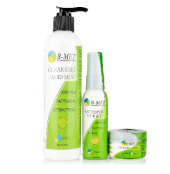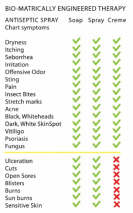PREVENCION
¿Qué son las enfermedades de transmisión sexual (ETS)?
Las ETS son enfermedades que se pasan de una persona a otra a través del contacto sexual. Estas incluyen la clamidia, la gonorrea, los herpes genitales, el virus del papiloma humano (VPH), la sífilis y el VIH. Muchas de estas enfermedades no tienen síntomas por un largo tiempo. Incluso sin síntomas, aún pueden hacer daño y transmitirse durante las relaciones sexuales.
¿Cómo se propagan las ETS?
Puedes contraer una ETS al tener relaciones sexuales vaginales, anales u orales con alguien que tenga alguna de ellas. Cualquier persona sexualmente activa puede contraer una enfermedad de transmisión sexual. Ni siguiera es necesario hacer el acto sexual completo (tener relaciones sexuales anales o vaginales) para contraer una ETS. Esto se debe a que algunas de estas enfermedades, como el herpes y el VPH, se propagan por el contacto de piel a piel.
¿Qué tan comunes son las ETS?
Las enfermedades de transmisión sexual son comunes, especialmente en las personas jóvenes. Cada año hay alrededor de 20 millones de casos nuevos de ETS en los Estados Unidos. Cerca de la mitad de estas infecciones se dan en personas de 15 a 24 años. Las personas jóvenes tienen un mayor riesgo de contraer ETS por varias razones:
⦁ El cuerpo de las mujeres jóvenes es biológicamente más propenso a las ETS.
⦁ Algunas personas jóvenes no se hacen las pruebas de ETS recomendadas.
⦁ Muchas personas jóvenes son reacias a hablar abierta y francamente sobre su vida sexual con un médico o un enfermero.
⦁ No tener seguro o transporte puede dificultar el acceso de las personas jóvenes a las pruebas de ETS.
⦁ Algunas personas jóvenes tienen más de una pareja sexual.
¿Qué puedo hacer para protegerme?
⦁ La manera más segura de protegerte contra las enfermedades de transmisión sexual es no tener relaciones sexuales. Esto significa no tener ninguna relación sexual vaginal, anal u oral (“abstinencia”). Hay que. Está bien decir “no” si no deseas tener relaciones sexuales.
⦁ Si decides tener relaciones sexuales, tanto tú como tu pareja deberían hacerse antes una prueba de ETS. Asegúrate de que tú y tu pareja usen un condón de principio a fin cada vez que tengan relaciones sexuales orales, anales o vaginales. Sepan dónde conseguir condones y ⦁ cómo usarlos correctamente. No es seguro dejar de usar condones a menos que ambos se hayan hecho una prueba de ETS, sepan los resultados, y estén en una relación monógama mutua.
⦁ La monogamia mutua significa que tanto tú como tu pareja están de acuerdo en tener contacto sexual solamente entre ustedes. Esto puede ayudar a protegerse contra enfermedades de transmisión sexual, siempre y cuando ambos se hayan hecho pruebas de detección y sepan que no tienen ninguna de estas enfermedades.
⦁ Antes de tener relaciones sexuales, habla con tu pareja sobre cómo vas a prevenir las ETS y el embarazo. Si piensas que estás listo(a) para tener relaciones sexuales, también debes estarlo para proteger tu cuerpo. También deberías hablar antes con tu pareja sobre lo que harás o no harás sexualmente. Tu pareja debe respetar siempre tu derecho a decir que no a cualquier cosa que te resulte incómoda.
⦁ Asegúrate de conseguir la atención médica que necesites. Pregúntale a un médico o a un enfermero sobre las pruebas de ETS y las vacunas contra el VPH y la hepatitis B.
⦁ Las niñas y las mujeres jóvenes podrían tener necesidades adicionales para proteger su salud reproductiva. Habla con tu médico o enfermero acerca de las pruebas de detección del cáncer de cuello uterino que se realizan periódicamente y las pruebas de clamidia y gonorrea. Quizás desees hablar también sobre ⦁ el embarazo no planificado y los métodos anticonceptivos.
⦁ Evita combinar el consumo de alcohol o drogas recreativas con las relaciones sexuales. Si consumes alcohol y drogas, tienes más probabilidades de adoptar conductas riesgosas, como no usar un condón o tener relaciones sexuales con alguien con quien normalmente no las tendrías.
Si contraje una ETS, ¿cómo lo sabré?
Muchas enfermedades de transmisión sexual no causan ningún síntoma que puedas notar. La única manera de saber con certeza si tienes una ETS es hacerte una prueba. Puedes contraer una ETS al tener relaciones sexuales con una persona que no tenga síntomas. Al igual que tú, esa persona quizás ni siquiera sepa que tiene una enfermedad de transmisión sexual.
¿Dónde puedo hacerme la prueba?
Hay lugares que ofrecen pruebas de ETS gratuitas, confidenciales y dirigidas a los adolescentes. Esto significa que nadie tiene que saber que te has hecho la prueba. Visita la página HágaseLaPrueba para encontrar un sitio cercano a ti donde se hacen las pruebas de ETS.
¿Pueden tratarse las ETS?
Tu médico te puede recetar un medicamento para curar algunas de las enfermedades de transmisión sexual, como la clamidia y la gonorrea. Otras ETS, como los herpes, no se pueden curar, pero puedes tomar medicamentos para ayudar a manejar los síntomas.
Si alguna vez recibes un tratamiento para una ETS, asegúrate de terminar todo el medicamento, incluso si te sientes mejor antes de haberlo usado por completo. Pregúntale al médico o al enfermero sobre pruebas y tratamiento para tu pareja también. Tú y tu pareja deberían evitar tener relaciones sexuales hasta que ambos hayan sido tratados. De lo contrario, podrían continuar pasándose la ETS de uno al otro. Es posible contraer de nuevo una enfermedad de transmisión sexual (después de haber recibido tratamiento) si tienes relaciones sexuales con una persona que tenga una de estas enfermedades.
¿Qué pasa si no recibo tratamiento para una ETS?
Algunas enfermedades de transmisión sexual curables pueden ser peligrosas si no se las trata. Por ejemplo, si no se tratan, la clamidia y la gonorrea pueden hacer que a una mujer le sea difícil, o incluso imposible, quedar embarazada. También aumentas tus probabilidades de contraer el VIH si tienes una ETS sin tratar. Algunas enfermedades de transmisión sexual, como el VIH, pueden ser mortales si se dejan sin tratar.
¿Qué ocurre si mi pareja o yo tenemos una ETS incurable?
Algunas enfermedades de transmisión sexual, como los herpes y el VIH, son incurables, pero el médico puede recetar medicamentos para tratar los síntomas.
Si tienes una ETS, es importante que se lo digas a tu pareja antes de tener relaciones sexuales. Si bien es posible que te sea incómodo hablar sobre tu ETS, conversar abierta y francamente puede ayudar a tu pareja a tomar decisiones informadas para proteger su salud.
Si tengo preguntas, ¿quién me las puede responder?
Si tienes preguntas, habla con uno de tus padres o un adulto de confianza. No tengas miedo de ser abierto y sincero con ellos sobre lo que te preocupe. Si alguna vez te sientes confuso o necesitas un consejo, consúltalos a ellos primero. Después de todo, ellos también fueron jóvenes alguna vez.
Hablar sobre sexo con uno de tus padres o con otro adulto no tiene que ocurrir solo una vez. Es mejor dejar la puerta abierta para conversar en el futuro.
También es importante hablar francamente con un médico o un enfermero. Pregúntales cuáles pruebas de ETS y vacunas te recomiendan.
https://www.cdc.gov/std/spanish/stdfact-stdriskandoralsex-spa.htm






